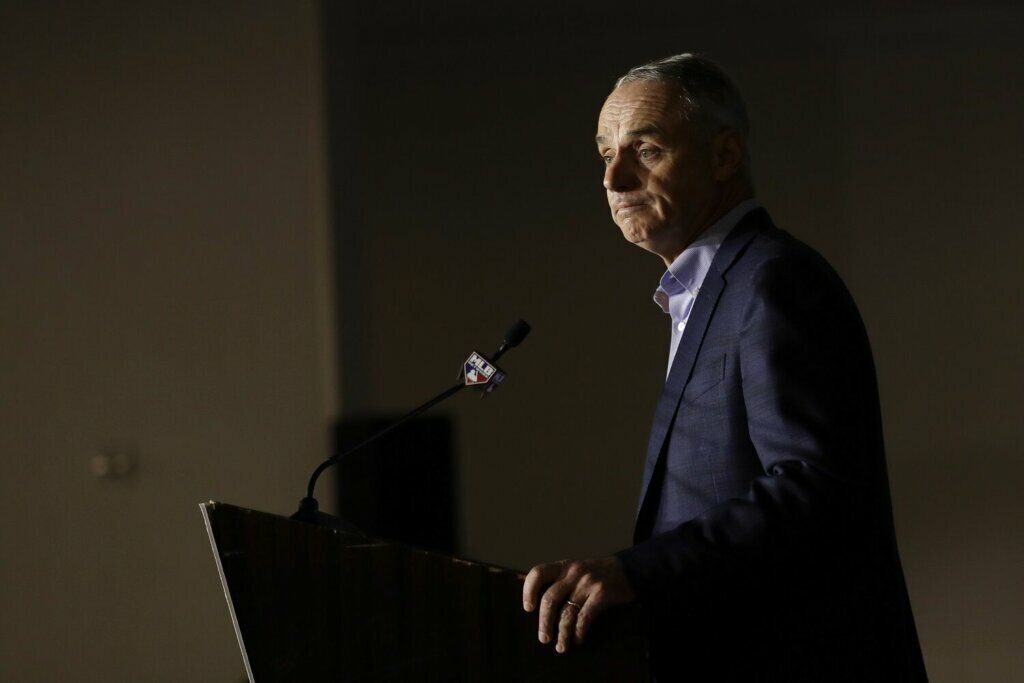
Baseball is in crisis.
Sure, a quick look at revenues shows a sport pulling in more money than ever. But it also belies two impending battles, major conflicts the man responsible for stewarding the game into the future has shown himself perhaps incapable of resolving without serious damage to the game.
After a contested election, commissioner Rob Manfred was given a five-year term starting Jan. 2015. That was extended for five more years through 2024 after the 2018 season. But MLB’s owners may want to rethink that vote.
The gains Manfred has made appear to be more than offset by continued attrition of attendance, unnecessary labor strife and now, the long-term reduction or even outright dissolution of the backbone of baseball in small towns and cities all around America that MLB won’t touch: the minor leagues.
This is not normal. It’s a breach of the founding values upon which baseball has grown and spread as an American institution. It’s the same kind of shortsighted, corner-cutting, win-at-all-cost approach that seemed like a good idea when the Houston Astros won the World Series a couple years ago, but now looks a lot less brilliant in retrospect.
Did you know there is a fan petition to remove Manfred from office? And it was drafted well before any of his latest outbursts and missteps.
But ultimately, only the owners have the power to do something before things get immeasurably worse.
Such a move wouldn’t be unprecedented. Former MLB Commissioner William Eckert was forced to resign in 1968 staring down an impending labor strike for which he was wholly unprepared, just three years into a seven-year term.
At the end of the day, the commissioner serves the owners, and if he isn’t actually promoting their best interests, in the long term as well as the short, they have the power to remove him.
Manfred inherited a good economy from his predecessor and has lived off the successes of that administration. The $1.5 billion windfall that came last year was from the partial sale of BAMTech, a venture started well before his tenure.
His new deal with the umpires opens up the possibility of implementing an electronic strike zone, as MLB tested out in the Atlantic League last season. But that league used Trackman, a system with enough inaccuracy that MLB itself doesn’t even use it anymore for its own pitch-tracking data.
Manfred has had at least a year (longer, if you’ve been paying attention) to steel himself for the impending labor unrest at the expiration of the current collective bargaining agreement. And yet, despite 17-straight record-breaking revenue years — MLB pulled in $10.7 billion last year — average MLB salaries dropped for the second-straight year.
A year later, we’re no closer to peace at the end of the tunnel.
Just last month, as the MLBPA extended an unusual early olive branch, two years before the expiration of the collective bargaining agreement, Manfred responded by reaching out and lighting it on fire, saying there is “not going to be a deal where we pay you in economics to get labor peace,” and that “maybe Marvin Miller’s financial system doesn’t work anymore.”
That’s the Marvin Miller that was just elected to the National Baseball Hall of Fame. His system is free agency, the one that’s brought those previously unfathomable record revenues.
Perhaps such a response shouldn’t surprise us, given that nearly every one of Manfred’s ideas is painfully ahistorical. That childish, blustery bargaining tactic foreshadowed his even more immature comeback to a detailed, measured response by the minor leagues to his attacks.
Minor League Baseball just came out with a very lengthy response to MLB in re: PBA negotiations. Here are some highlights: pic.twitter.com/cZntrf0RAX
— Josh Norris (@jnorris427) December 14, 2019
What did Manfred do in response? Threaten to take his ball and go home, to dissolve a century of mutually beneficial partnership between the majors and minors, just because he was accurately called out.
That’s not leadership. It’s the kind of posturing bullies use on the playground, not responsible adults leading one of America’s biggest businesses and most cherished pastimes.
Maybe it’s jealousy. The MLB has declined in attendance every year since Manfred’s first full season in command in 2015, down more than 7% overall in those five years.
Meanwhile, Minor League Baseball topped 40 million fans for the 15th straight year, rebounding from a dip last year to post the ninth-highest total in MiLB history in 2019. That’s remarkable stability in the face of a declining product at the major league level.
Under Manfred’s watch, baseball has seen record revenues, all while refusing to spend that money on the labor generating the interest that sells those lucrative TV and sponsorship deals.
Now he’s threatening to refuse to support the pipeline that sculpts and nurtures the next generation of talent that makes the game great. It’s almost as if he has no idea how this industry works, or of the collective bargaining process to which he and the league are bound.
During his tenure, so many teams have punted on even pretending to field a competitive team that the sport reached historic levels of inequality this season.
It honestly doesn’t even seem like he enjoys the job, or the privilege and honor of leading such an American institution. His policies are shortsighted, and while some owners have benefited in the short-term, it’s come at long-term expense to the game and everyone who works in and loves it.
Perhaps most disconcerting, Manfred has shown his words have no meaning. Only days after complaining that minor league officials were waging a public PR campaign, he took to the microphone at the Baseball Winter Meetings … to wage a public PR campaign.
It’s become clear that these actions aren’t aberrations — they represent who he fundamentally is. So, for the good of the game, not just today but for generations to come, it’s time to remove Manfred from his post.







